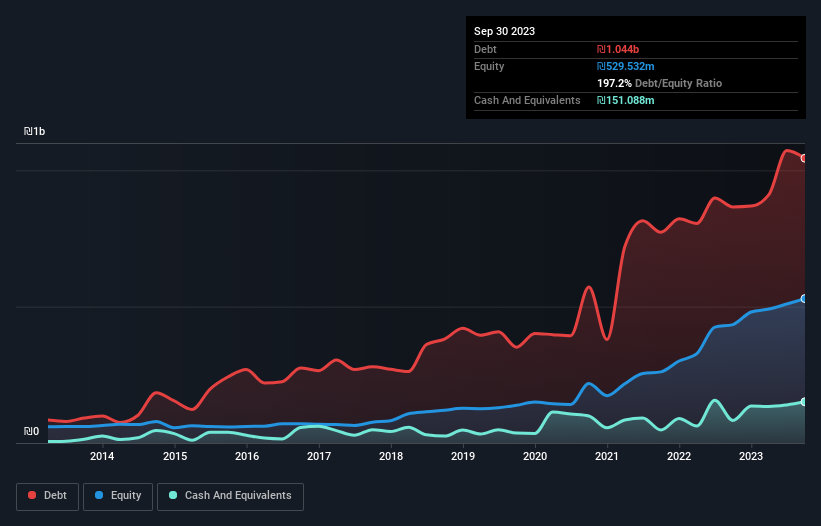
Warren Buffett famously said, 'Volatility is far from synonymous with risk.' So it might be obvious that you need to consider debt, when you think about how risky any given stock is, because too much debt can sink a company. Importantly, Rotshtein Realestate Ltd (TLV:ROTS) does carry debt. But should shareholders be worried about its use of debt?
When Is Debt Dangerous?
Generally speaking, debt only becomes a real problem when a company can't easily pay it off, either by raising capital or with its own cash flow. If things get really bad, the lenders can take control of the business. However, a more frequent (but still costly) occurrence is where a company must issue shares at bargain-basement prices, permanently diluting shareholders, just to shore up its balance sheet. Of course, debt can be an important tool in businesses, particularly capital heavy businesses. The first step when considering a company's debt levels is to consider its cash and debt together.
Check out our latest analysis for Rotshtein Realestate
What Is Rotshtein Realestate's Net Debt?
As you can see below, at the end of September 2023, Rotshtein Realestate had ₪1.04b of debt, up from ₪865.8m a year ago. Click the image for more detail. On the flip side, it has ₪151.1m in cash leading to net debt of about ₪893.2m.

A Look At Rotshtein Realestate's Liabilities
According to the last reported balance sheet, Rotshtein Realestate had liabilities of ₪1.11b due within 12 months, and liabilities of ₪434.0m due beyond 12 months. On the other hand, it had cash of ₪151.1m and ₪310.4m worth of receivables due within a year. So it has liabilities totalling ₪1.08b more than its cash and near-term receivables, combined.
The deficiency here weighs heavily on the ₪537.8m company itself, as if a child were struggling under the weight of an enormous back-pack full of books, his sports gear, and a trumpet. So we'd watch its balance sheet closely, without a doubt. After all, Rotshtein Realestate would likely require a major re-capitalisation if it had to pay its creditors today.
We measure a company's debt load relative to its earnings power by looking at its net debt divided by its earnings before interest, tax, depreciation, and amortization (EBITDA) and by calculating how easily its earnings before interest and tax (EBIT) cover its interest expense (interest cover). Thus we consider debt relative to earnings both with and without depreciation and amortization expenses.
With a net debt to EBITDA ratio of 7.1, it's fair to say Rotshtein Realestate does have a significant amount of debt. However, its interest coverage of 3.5 is reasonably strong, which is a good sign. Worse, Rotshtein Realestate's EBIT was down 30% over the last year. If earnings keep going like that over the long term, it has a snowball's chance in hell of paying off that debt. The balance sheet is clearly the area to focus on when you are analysing debt. But you can't view debt in total isolation; since Rotshtein Realestate will need earnings to service that debt. So if you're keen to discover more about its earnings, it might be worth checking out this graph of its long term earnings trend.
But our final consideration is also important, because a company cannot pay debt with paper profits; it needs cold hard cash. So we clearly need to look at whether that EBIT is leading to corresponding free cash flow. During the last two years, Rotshtein Realestate burned a lot of cash. While investors are no doubt expecting a reversal of that situation in due course, it clearly does mean its use of debt is more risky.
Our View
To be frank both Rotshtein Realestate's EBIT growth rate and its track record of staying on top of its total liabilities make us rather uncomfortable with its debt levels. And even its net debt to EBITDA fails to inspire much confidence. Considering everything we've mentioned above, it's fair to say that Rotshtein Realestate is carrying heavy debt load. If you play with fire you risk getting burnt, so we'd probably give this stock a wide berth. When analysing debt levels, the balance sheet is the obvious place to start. But ultimately, every company can contain risks that exist outside of the balance sheet. For example, we've discovered 4 warning signs for Rotshtein Realestate (2 are significant!) that you should be aware of before investing here.
When all is said and done, sometimes its easier to focus on companies that don't even need debt. Readers can access a list of growth stocks with zero net debt 100% free, right now.
New: AI Stock Screener & Alerts
Our new AI Stock Screener scans the market every day to uncover opportunities.
• Dividend Powerhouses (3%+ Yield)
• Undervalued Small Caps with Insider Buying
• High growth Tech and AI Companies
Or build your own from over 50 metrics.
Have feedback on this article? Concerned about the content? Get in touch with us directly. Alternatively, email editorial-team (at) simplywallst.com.
This article by Simply Wall St is general in nature. We provide commentary based on historical data and analyst forecasts only using an unbiased methodology and our articles are not intended to be financial advice. It does not constitute a recommendation to buy or sell any stock, and does not take account of your objectives, or your financial situation. We aim to bring you long-term focused analysis driven by fundamental data. Note that our analysis may not factor in the latest price-sensitive company announcements or qualitative material. Simply Wall St has no position in any stocks mentioned.
About TASE:ROTS
Rotshtein Realestate
Develops and constructs residential projects in Israel.
Solid track record and good value.
Market Insights
Community Narratives



